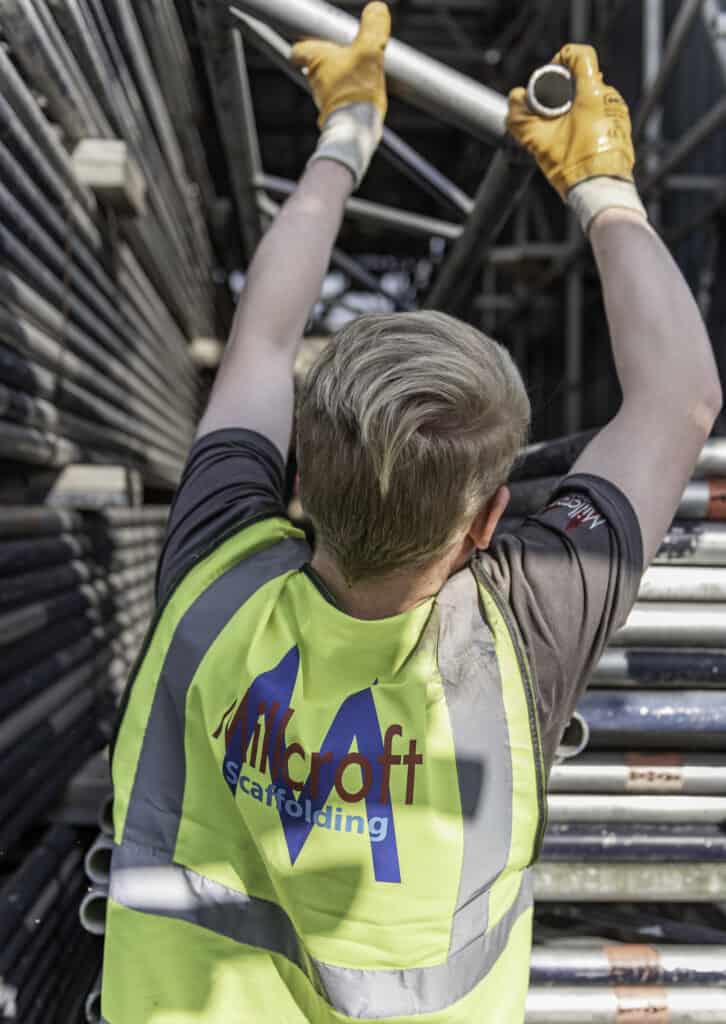In an industry grappling with the challenge of increasing its workforce, Billy Jones, the Managing Director of Millcroft Scaffolding, shares his insights on the pressing need to attract young talent to scaffolding—a sector often overlooked by the younger generation seeking fulfilling careers.
It is no secret that the construction sector, particularly scaffolding, is dealing with a pressing issue – a shortage of new workers. While scaffolding can offer a rewarding career, it’s clear that there are challenges in recruiting and retaining young people. Billy Jones, Millcroft’s Managing Director, discusses his concerns and what he believes the industry can do to challenge how the younger generation perceives and approaches working in this sector.
The quality of candidates, particularly young people coming into our sector, has been playing a lot on my mind recently. At Millcroft, we’re proud of our low staff turnover and the opportunities we offer our employees, however, we’re finding it increasingly difficult to attract and recruit the right talent, and I’m sure we’re not the only company facing this problem.
A recent YouGov survey for the Deconstruction campaign found that 77% of 18-24 year old students would not consider a career in construction. Why is this? What is putting the younger generation off, and how do we, as an industry, change perceptions?
The post-pandemic generation

Following the Covid-19 pandemic, there has been a sharply increased demand for hybrid and flexible working in some sectors. I appreciate that times have changed post-pandemic, and we need to be considerate to employees’ needs, but while these working practices might work well in some office environments, they do not easily lend themselves to scaffolding. This could put some recruits off a career in our industry, so rather than present it as a rigid work environment, we need to promote the clear benefits: a rewarding and potentially lucrative career path, good pay and support, interesting work, fresh air and fitness from the job, camaraderie, to name but a few. We can still provide the positive workplace experience many people are looking for, but this does need to be face-to-face, either in the office or out on site.
Starting a new job is daunting, and the workplace can be an unfamiliar environment for many of the younger generation. Suddenly, they must learn different policies, working practices and how to interact with people other than their friends or family. Working in person, whether in an office or on site, helps them to develop their interpersonal skills, create collaborative relationships with colleagues and managers, socialise, and generally feel like an integral part of the company. It builds confidence and enables a person to learn ‘on the job’ and through mentoring by other experienced team members. If working remotely, young people can feel disconnected, less committed and are more likely to miss out on career development opportunities.
The ethical dilemma
I’m sure this will be incendiary, but from our experience, there does appear to be a decline in the commitment of young candidates coming through today. Many of the candidates we have seen recently have failed to grasp the ethics required for the scaffolding sector. Fundamental principles such as respect for supervisors and foremen can often be lacking, and many seen to become disenchanted with routine tasks.

Scaffolding is an excellent career choice, but those entering the sector today must be under no illusion. On the labouring side, it is manual work and can be tough; you need to put in a solid day’s effort, which can mean early starts and working in unpleasant weather. But the rewards are great: stability, variety and pride in what you do are just a few.
Our senior contracts manager, Darren Hayward, likens the qualities needed for a role in scaffolding to those he learned during his time in the Royal Marines. “The Marines is a high-intensity environment, but scaffolding can be too. Resilience is a key skill to have. Scaffolding is a tough job and is easily underestimated, but it is also extremely rewarding and can provide a very good living. A strong work ethic, good moral values, and a humbleness to learn from others will always give you a positive return.”
Unrealistic expectations
Linked to this ethical dilemma is the unrealistic expectations some young starters can have around salaries and progression. In our experience, there is sometimes a sense of entitlement, with many expecting pay raises and promotions without necessarily earning them.
At Millcroft, we try to overcome this by being very clear on what our business is about and what we expect. It’s a two-way thing. We offer competitive salaries, an excellent working environment, training and career progression, and in return, we ask for commitment and loyalty.
Many of our team members have spent years developing their skills, and starting at the bottom and working up is often an integral part of scaffolding. Mark Stimpson is a perfect example. Mark joined Millcroft in 1985 as a labourer and is now our operations director, responsible for helping to deliver our commercial strategy and ensuring our clients’ requirements are met on site.
Likewise, Richard Ramkissoon, our Health & Safety Advisor, started his career as a ganger man. Learning on the job has given Richard a great understanding of construction sites and safe practices, which have helped him to develop his career in health & safety.

Lack of diversity
There can be an outdated perception that scaffolding lacks diversity. These views are based on stereotypes and need to be quashed to attract the right talent.
Millcroft’s workforce comprises people with diverse backgrounds, including several females. For example, Corita Ware originally joined us as credit controller/office administrator, a role that included managing our numerous accreditations and audits. Corita has a great work ethic and an excellent ‘can-do’ attitude and is now our project coordinator, spending part of her week at our HS2 site in Acton, where she is instrumental in helping to ensure the project runs smoothly.
Something Corita has noticed while working on site, which I hope potential young employees will take on board, is there’s an increased presence of women in what were traditionally seen as male roles. “It’s nice to see the different ages, young women and older ladies on site. 100% I’ve noticed a change. It’s lovely to see the different age groups and backgrounds,” says Corita.
Education is key
If we want to tackle the recruitment and skills gap issues, we must present scaffolding as an attractive career with many opportunities.
As an industry, we need to engage with local education providers and the community to educate the workforce of the future and demonstrate the variety of roles within the scaffolding sector. This is something we have done through our work with the Construction Youth Trust and also as part of our social vale commitment to HS2 where our senior contracts manager has led presentations to young people at careers fairs. It’s not just about working ‘on the tools’. There are roles for anyone, from a site foreman or contracts manager to an accountant or within human resources.
Furthermore, contrary to popular belief, our industry is innovative and has embraced technological advancements, so there are opportunities for people to work with AI, 3D imaging, and 4D video. Indeed, one of our original young ‘Kickstart’ recruits is now a key member of our design team.
We can bring in new talent and invest in the next generation by showcasing varied opportunities, supporting apprenticeship and trainee schemes, and encouraging career development through training and support.
Collaborating to reshape perceptions
Sometimes, you need to tell it how it is and be slightly controversial to start a discussion. So, hopefully, by being open about the recruitment issues we’re facing at Millcroft and discussing how we’re trying to change perceptions, we can encourage the industry to work together to dispel the misconceptions many have.
The challenges of recruiting and retaining young talent in our sector are real, but with a concerted effort, we can change this. We need to communicate what the job involves and emphasise the opportunities it provides for those willing to work hard and develop their skills over time. Realistic messaging is important so that new starters understand both the demands and the rewards a career in scaffolding offers them.
This article was originally published in Issue 21 of the ScaffMag magazine.


